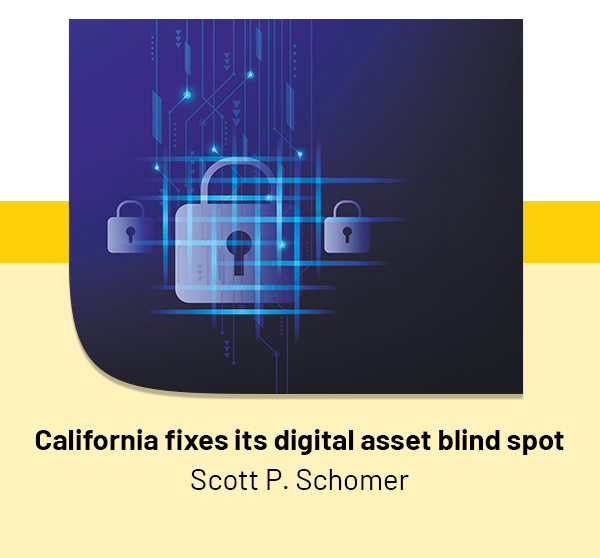Wills, Estates & Trusts,
Probate
Oct. 15, 2025
California fixes its digital asset blind spot
See more on California fixes its digital asset blind spot



Scott P. Schomer
Trust and Estate Attorney and Founder of Schomer Estate & Wealth Advisors
2155 Campus Drive, Suite 250
El Segundo , CA 90245
Phone: (310) 337-7696
Email: scott@schomerlaw.com

You've heard the stories, and they are all too real. A San Francisco engineer sits before a hard drive containing hundreds of millions in Bitcoin, with only two password attempts left before it erases itself forever. A grieving husband pleads with Apple to unlock his late wife's iCloud account so he can recover their family photographs, only to spend months battling in court while the images remain locked away. Parents who lost their teenage daughter in an accident are told that Facebook will not give them access to her account, leaving her words and memories sealed off until years of litigation finally forces a result. The supercomputers in our pockets hold the keys to our digital lives, but unlike the spare set left with a neighbor, there is no easy way back in once the door is closed.
These tales sound extreme, yet they highlight the daily frustration of families and of California's licensed professional fiduciaries who are charged with managing digital property. On paper, the first duty of a fiduciary is simple enough: marshal all assets. In practice, digital assets are often the most elusive. They are harder to collect than mineral rights and more likely to vanish without a trace.
California's old statute added to the misery. When the Legislature adopted the Revised Uniform Fiduciary Access to Digital Assets Act (RUFADAA) in 2016, it did so with scissors in hand. The law allowed executors and trustees to request access to digital property after a user had died, but it offered nothing to fiduciaries acting while the user was still living. Agents under powers of attorney, conservators, and guardians were left without a statute to point to when they knocked on the custodian's door.
That gap was not academic. Incapacity is often when access matters most. A sudden stroke, a decline from dementia, or even a routine hospitalization can leave accounts in limbo. Bills go unpaid. Businesses falter. Health portals sit locked. Families expect successor trustees or conservators to step in, only to learn that the law provides no clear path to digital access.
Professional fiduciaries tried to improvise. Some reached for a password they happened to find scribbled on a notepad. Others wondered if holding a phone up to a finger or face might work. The problem with such self-help solutions is that federal law frowns on them. The Stored Communications Act makes it unlawful for service providers to divulge the contents of communications without proper authority. The Computer Fraud and Abuse Act goes further, punishing anyone who accesses a computer "without authorization." A fiduciary logging in with a discovered password, or pressing a conservatee's finger to a device, could arguably be committing a federal offense.
Meanwhile, forty-five other states had already adopted the full model version of RUFADAA, including provisions for fiduciaries of living users. California's decision to narrow its statute left families anxious and professional fiduciaries exposed.
The Legislature has now closed the gap. Senate Bill 1458, effective Jan. 1, 2025, ushers in what can fairly be called RUFADAA 2.0. The updates are substantial.
Expanded Definition of Fiduciary (Probate Code section 871). The law now defines fiduciary to include not only executors and trustees, but also agents under powers of attorney, conservators and guardians. This aligns the treatment of digital assets with the broader incapacity planning framework already found throughout the Probate Code.
New Disclosure Provisions (sections 879.1 through 879.3).
• Section 879.1 authorizes disclosure of the content of electronic communications to agents with proper authority.
• Section 879.2 provides for disclosure of catalogues of communications and other digital assets to agents.
• Section 879.3 empowers courts to grant conservators access to a conservatee's digital assets.
Conforming Amendments (sections 872, 880, 881). These provisions now apply to fiduciaries acting under powers of attorney and conservatorships, whether created before or after the effective date. The duties of care, loyalty, and confidentiality expressly extend to these fiduciaries, and custodians are required to respect their authority.
The effect is to integrate digital assets into California's mainstream incapacity law. A durable power of attorney for finances now carries statutory authority to demand digital access. A conservator can obtain disclosure as readily as they can marshal tangible property. Guardians, too, are expressly recognized as fiduciaries in the digital realm.
For families, the change means less stress during already painful moments. For professional fiduciaries, it means they no longer face the impossible choice between carrying out their duties and breaking federal law. Custodians may still demand specific documentation, and federal statutes still restrict unauthorized log-ins, but fiduciaries now have black letter law on their side.
Practitioners should update estate planning documents to reference digital assets directly. Clients should be encouraged to use online tools such as Apple's Digital Legacy or Google's Inactive Account Manager. Fiduciaries should act quickly to identify and secure digital property, knowing they now have statutory footing to insist on cooperation.
California has finally caught up with reality. RUFADAA 2.0 ensures that fiduciaries can fulfill their oldest duty, which is to marshal all assets. In the digital era, that means more than deeds and bank accounts. It means cryptocurrency keys, cloud accounts and medical portals. For years, California treated those assets as an afterthought. Now, at long last, the law gives fiduciaries the keys to the digital kingdom, without having to guess the password or hold up a finger.
For reprint rights or to order a copy of your photo:
Email
Jeremy_Ellis@dailyjournal.com
for prices.
Direct dial: 213-229-5424
Send a letter to the editor:
Email: letters@dailyjournal.com


